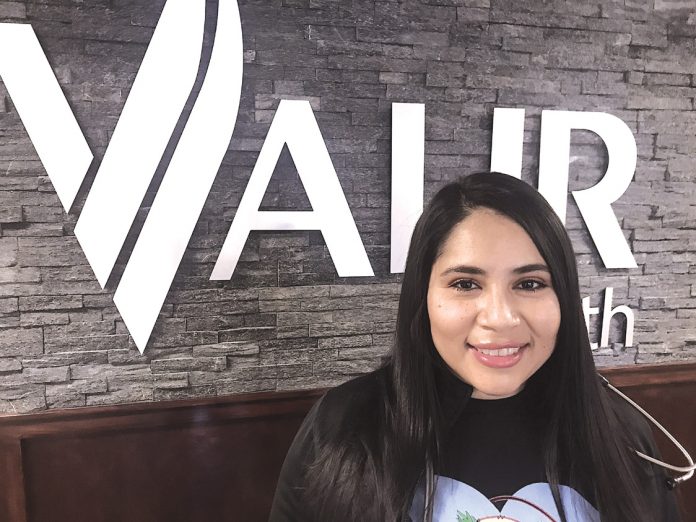by James Coburn – staff writer
It’s evident that Esthela Quiroz is a seasoned nurse when listening to her discuss her career as an LPN at Valir Rehabilitation Hospital, located in midtown Oklahoma City. Since 2009 she has been part of the Valir team, working to improve people’s lives.
One of the main things she focuses on is getting a patient’s pain under control so that they may better participate in the program. Especially during the pandemic, the nurses make sure the equipment is clean. Equipment is disinfected between each patient appointment.
The inpatient program has the patients staying an average of 10 to 14 days. A lot of patients are recuperating from strokes, knee surgeries, spinal cord injuries. A unit is dedicated to traumatic brain injuries. Liaisons go out and look for patients who could benefit from the hospital. Services include physical therapy to help them walk, occupational therapy to carry out simple physical tasks such as brushing teeth. Speech therapy helps people communicate once more. (story continues below)
Oklahoma Children’s Hospital OU Health seeking Respiratory Care Practitioners
“They leave here and they’re walking. They’re able to care for themselves. They’re able to communicate with their families,” she said.
Quiroz’s mother was hospitalized around the time that she became a nurse. She entered rehab after hospitalization and Quiroz knew that rehabilitation was in her nursing future. She wanted to work at a rehab center where people leave with their speech restored and are once again able to walk.
“That’s what we see a lot here, especially the traumatic brain injuries,” Quiroz said. “That’s one of the units where I actually started working when I first started working here. I wanted to help people just like they helped my grandmother. I saw that the nurses were nice and compassionate. I wanted to help people and other families to get back on their feet. That’s what we do here.”
She loves that everybody works together for the common good of patient care. Management has been empathetic and concerned about their staff during the pandemic. During Thanksgiving and Christmas, the Valir leadership provided every Valir Rehabilitation Hospital employee a full dinner for their families.
“They were always checking on us and making sure that everything was going smoothly, making sure the patient is taken care of because that’s our priority,” Quiroz explained.
Being a Valir nurse means going above and beyond the call of duty during COVID. There were times when they would let their patients call their families with their own phones brought to work. Patients had anxiety and feared how the pandemic was sweeping across the country, she said.
“We would take out our phones and take it to them to make sure they were keeping in touch because that was important,” she continued.
Education is vital in helping patients adjust to being hospitalized, she said. A lot of people had little education about the introduction of vaccines and how they are helpful in spurring the immune system to fight COVID. They were going by the negative narratives on social media, Quiroz said.
She recalls a daughter who died. The experience touched Quiroz’s life. The mother had what Quiroz considered to be a perfect life with a husband. They shared a daughter who was handicapped.
“The daughter actually passed away here holding her hand,” Quiroz continued. “The daughter came to visit in her wheelchair, and she passed away. That touched me, especially the husband who was taking care of both the patient and the daughter.”
Quiroz said life changed for that family in a matter of seconds. This experience changed Quiroz to understand the importance of simple things that make life important. Valir Rehabilitation Hospital is an amazing place, Quiroz said. That’s why she has stayed through the years.
“I’ve worked with a lot of therapists and they’re here because they care about the patient,” she added. “I’ve seen a lot of changes here, too. But it is always for the better,” she said.
Pain management is a staple of the hospital. Quiroz strives to keep patients comfortable yet functional, which can be very challenging when some patients enter the rehab hospital directly from a hospital intensive care unit. The transition may be quick. At time the patient doesn’t know where they are going before reaching Valir or what to expect. So, a continuum of education is key to defray anxiety. Their transition to rehab involves the patient improving enough to safely go home.
“We have to be educated about every single pain medicine because it’s important to give patients the right information about what they are taking and why they are taking it,” she explained.
Even with a nationwide nursing shortage, a patient is never left alone without a system in place to provide help. Someone is always there for them, Quiroz said.
“Whether it’s the director of nursing, everybody steps in to help because it is hard,” she said of the nursing shortage.
“We have to put patients at ease and assure them that we’re going to be taking care of them no matter what,” she said.
Nurses never say to their patients that they are challenged with their workload.
So, she cherishes the many thank you calls and notes received from patients and their families.
“We’re always working short, and a lot of people don’t know that. So, whenever we do have someone who says thank you and understands, that means a lot,” she said.
For more information visit https://www.valir.com/













